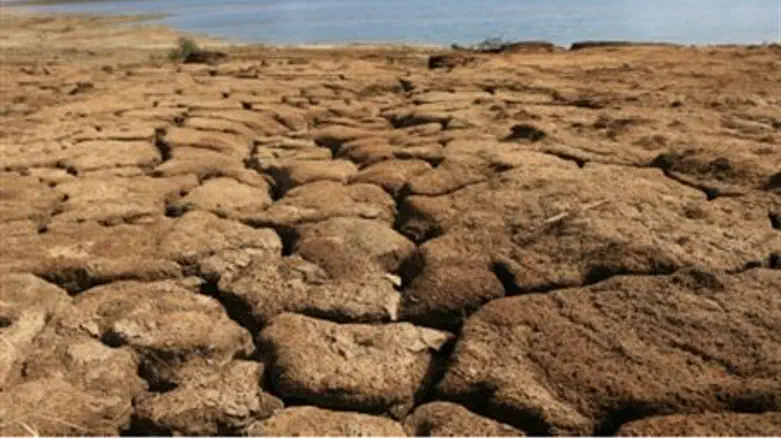
Israel is facing the driest winter since 1927, Ma'ariv reports Monday, leaving experts concerned.
The Kinneret (Sea of Galilee)'s water level has dropped by four centimeters since the rainy season began, compared to a 1.97 meter rise over the same five-month period in 2013.
Israel has seen slight rain this month, but apparently it has not been making enough of an impact to change the drought situation. Israel's Water Authority stated Monday that the water level in the Kinneret rose by only two centimeters from the beginning of the February, compared to February 2013, which saw a 37 centimeter increase. The rise appears to be an accumulation of previous rainfall though, since in February 2013 no rain fell in Israel at all.
Officials stated that extra precautions are being made in the event that the drought continues.
"We have already set up extra desalination facilities, and water purifying centers, as well as [encouraged] proper water use and conservation," Water Authority spokesman Uri Shor stated. "This preparation allows us to provide enough water for regular use, even when Israel faces a dry spell."
Farmers are facing a real problem. Rather than just rain, they need extra water to irrigate fields and orchards, which comes at the expense of their annual water allotments. While there may be enough in their quotas to water their fields now, farmers potentially face the possibility of having no water at all for the arid summer months.
The Israeli Farmers' Federation (IFF) has already turned to the government for help dealing with the crisis.
"Farmers all over the country are forced to irrigate their fields and orchards, and if the situation continues like this, they might suffer heavy expenses," IFF spokesman Avshalom Vilan explained. "This may lead to a serious crisis for farmers that will also affect crops and produce."
"We need to find a quick and immediate solution with the help of the Israeli government, to prevent heavy damage which is bound to affect the spring and summer harvest," he added.
Those comments echoed similar concerns voiced earlier this month by the Israeli Agricultural Federation. A spokesman for the Federation called on he government to urgently supplement inadequate water resources by increasing desalinization efforts.
The drought will also affect the tourism ministry, as the lush landscapes in the Galilee and the Golan Heights drive more customers to bed and breakfasts and other vacation spots.
Even Mount Hermon was affected.
"I think this is the first year the snow did not attract the same quantity of tourists as usual," Sharon Lifschitz, CEO of tour company Eretz HaGalil noted. "Everyone went to Jerusalem, or Samaria, or the North during the storm."
"What we see going on here is something very rare," Zahi Waxma, forecaster for Meteo-tech, explained. "Months have passed since the storm and the amount of rain that fell in the north stands at less than 10 mm per month. We are at the peak of the rainy season, which means we should see about 100-200 mm of rainfall while, in practice, there are places seeing only 5 mm."